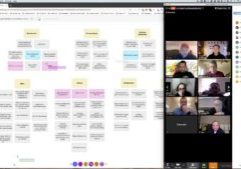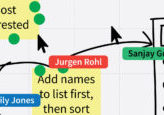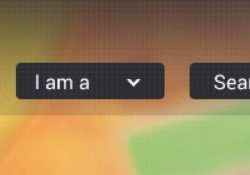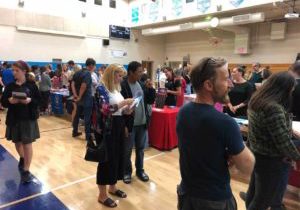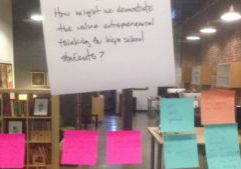When I began doing websites for higher education I researched everything. On one level this had to do with familiarizing myself with needs of the project, and not knowing what I needed to know in order to do the job well. And, partly this was political.
I wanted to be sure everyone who wanted to speak their mind on the project had the opportunity. A previous project required a presentation a large faculty group (80 members) where our group learned that apparently not enough members were consulted during the project. A heated discussion between the dean and faculty members ensued. We tried to slink away but remembered we were the ones giving the presentation. So, no slinking. And more research next time.
I typically conducted many weeks of research. For one website project I interviewed 60 students. 7 Staff focus groups. 8 online surveys. Then, transcribing the recordings and videos. Reviewing survey data. Presenting our findings. Building consensus for our recommendations. I confess also that I was motivated to use the research process to help figure out what we were going to do, how we going to approach the project goals. Later I learned that this is poor use of research, but live and learn as they say. But the more conversations we had, the more I came to depend on them for insights that would prove invaluable.
I was always hoping to hear that one killer insight, spoken casually perhaps, that turns that light on. Like the time a business school faculty member suggested that we shouldn't spend much time looking at other business school brands. Instead, he said we should examine "aspirational brands" like BMW and American Express. Not because business students want to see themselves as wealthy, but because choosing to get your MBA or any graduate degree is an "aspiration that you will achieve something greater." Umm, yeah. Of course we were going to do that.
But at some point, I distinctly recall thinking “I’m probably not going to hear the one insight that this project will pivot on." And this actually not the best use of your time with these people.
I've since come to believe that not every project requires a great deal of research (and not every project can afford it). It’s useful to to ask how much research is necessary. My rule is: what don’t we know? Do we have vision and knowledge of the aspects of the project that are unknown, or can we learn what we need to know from available data? Let's gather the information we don't have, and the information that we already have, and stop trying to guess where this process will take us.
For more on this notion I highly recommend Erika Hall's book Just Enough Research, of Mule Design and published by the good folks at A List Apart. Among the many valuable insights is this one:
"Your desire to find out needs to be greater than your desire to predict."
So, I've adjusted my process. I've stopped doing focus groups and replaced them with workshops. Instead of asking questions, and encouraging responses, I realized that I’d not get another opportunity to be in front of these folks again, and rather than asking the same question and expecting a radically different answer, my time with them would be much better spent workshopping with them.
My takeaways:
Use/leverage your own Institutional Research resources They know (or should) your environment better than anyone
Conduct your own research. You can do it, maybe you need a little help, but well within your grasp
Gather free HE sources Ruffalo Noel Levitz and other consultants produce reams of excellent, valuable research
Figure out what you don’t know before beginning, then fill in the gaps
Turn research into workshops Gather information ahead of meetings, turn it into knowledge through workshops.

